新人教版七年级下册英语期末复习
最新人教版英语七年级初一下册1-12单元期末复习资料 句型练习与解析
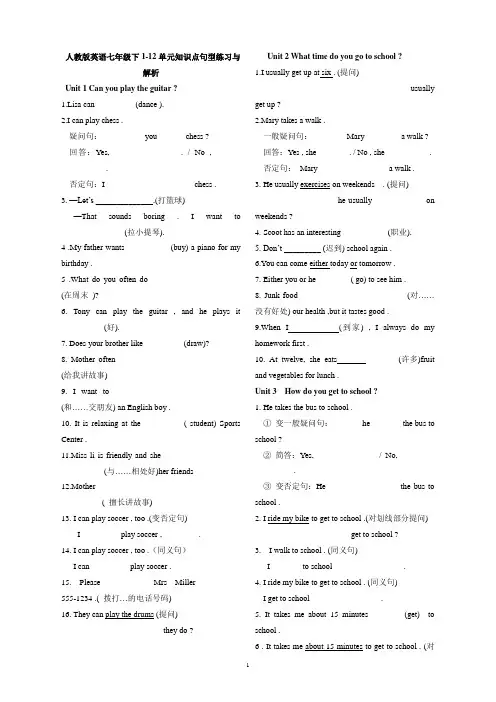
人教版英语七年级下1-12单元知识点句型练习与解析Unit 1 Can you play the guitar ?1.Lisa can _________ (dance ).2.I can play chess .疑问句:_________ you ______ chess ?回答:Yes, ______ ________ . / No , ______ ___________.否定句:I___________ __________ chess .3. —Let’s ____________.(打篮球)—That sounds boring . I want to _______________ (拉小提琴).4 .My father wants __________ (buy) a piano for my birthday .5 .What do you often do _________ ____________ (在周末)?6. Tony can play the guitar , and he plays it __________ (好).7. Does your brother like _________ (draw)?8. Mother often _________ __________ _________ (给我讲故事)9. I want to _________ __________ _________ (和……交朋友) an English boy .10. It is relaxing at the _________ ( student) Sports Center .11.Miss li is friendly and she ________ __________ __________ (与……相处好)her friends12.Mother _____ ____________ __________ __________( 擅长讲故事)13. I can play soccer , too .(变否定句)I _________ play soccer , ________ .14. I can play soccer , too .(同义句)I can _________ play soccer .15. Please _________ Mrs Miller _________ 555-1234 .( 拨打…的电话号码)16. They can play the drums (提问)__________ __________ they do ?Unit 2 What time do you go to school ?1.I usually get up at six . (提问)__________ _________ _______ _______ usually get up ?2.Mary takes a walk .一般疑问句:________ Mary ________ a walk ?回答:Yes , she _______ . / No , she __________ .否定句:Mary ________ ________ a walk .3. He usually exercises on weekends. (提问)_________ _______ he usually ____________ on weekends ?4. Scoot has an interesting _________ (职业).5. Don’t _________ (迟到) school again .6.You can come either today or tomorrow .7. Either you or he ________( go) to see him .8. Junk food _____ ______ _____ _______ (对……没有好处) our health ,but it tastes good .9.When I __________ (到家) , I always do my homework first .10. At twelve, she eats _____ _______(许多)fruit and vegetables for lunch .Unit 3 How do you get to school ?1. He takes the bus to school .①变一般疑问句:_______ he _______ the bus to school ?②简答:Yes, ______ _______ / No, ________ _________ .③变否定句:He _______ _________ the bus to school .2. I ride my bike to get to school .(对划线部分提问)_______ ______ ______ get to school ?3. I walk to school . (同义句)I _______ to school _______ _________ .4. I ride my bike to get to school . (同义句)I get to school _______ _________ .5. It takes me about 15 minutes _______ (get) to school .6 . It takes me about 15 minutes to get to school . (对1划线部分提问)._______ ________ ______ _______ _______ _______ to get to school ?7. It is about two kilometers from home to school . (对划线部分提问)._______ ________ ______ _______ from home to school?8. There are _______ _________ (二百) students on the playground .9.There are _________ __________(成百上千) people in the park .10. What do you think of the story book ? (同义句)_______ _______ _______ ________ the story book ?11. I think the story book is very interesting . (对划线部分提问)________ ________ ________ ________ ________ the story book ?12.It is easy for me __________ (learn) math well . 学好数学对我来说是容易的。
人教版七年级下册英语期末复习:Unit 7-Unit 12 各单元语法知识点复习提纲(全面!)
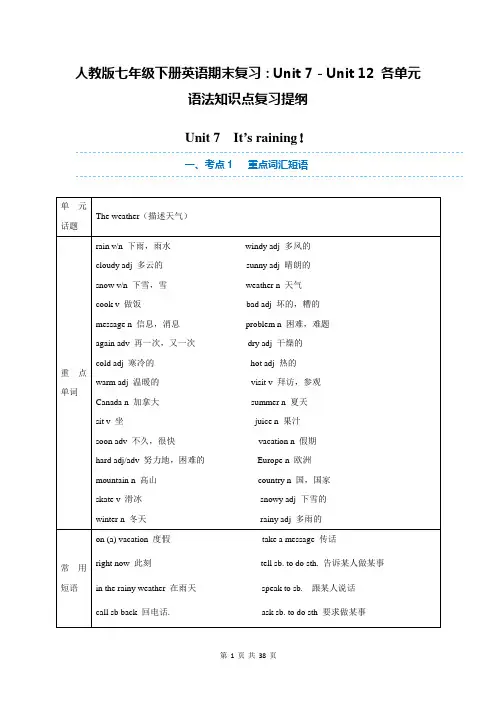
人教版七年级下册英语期末复习:Unit 7-Unit 12 各单元语法知识点复习提纲Unit 7 It’s raining!一、考点1 重点词汇短语1 messagemessage为可数名词,意为“消息,信息”,take a message for sb.“为某人捎个口信”。
拓展:give sb. a message 捎信给某人,leave a message 留口信,get the message 明白对方的意思。
Can I take a message for him?当某人发现要找的人不在或接电话的人发现打电话者要找的人不在时,常用此语2 could 情态动词意为“能,可以“,表示请求许可,在语气上比can委婉客气,但这种句式的肯定回答用can。
Could you just tell him to call me back?3 call及物动词,意为“打电话给”。
call sb. (up) “打电话给某人”,call sb. at +电话号码,意为“拨打……找某人”。
拓展:call 是一个多义词,call sb 可表示“叫醒某人,呼唤某人”;give sb. a call 给某人打电话。
4 back副词“回来,回原处,向后”;call sb. back给某人回个电话。
【即学即练】I’ll _____you _____.我将给你回电话。
5 visit此处用作及物动词,意为“拜访,探望”,后接表示人的名词或代词。
visit还可意为“参观,游览”,后接表示地点的名词。
拓展:visit还可用作可数名词,意为“访问,参观,拜访。
be on a visit to ... “正在访问/参观……”。
visitor参观者,游览者,游客。
I’m having a great time visiting my aunt in Canada._____ my grandparents every year at Christmas.我每年圣诞节都去探望我的祖父母。
七年级英语人教版(新目标)(最新版)下学期期末复习:知识点归纳
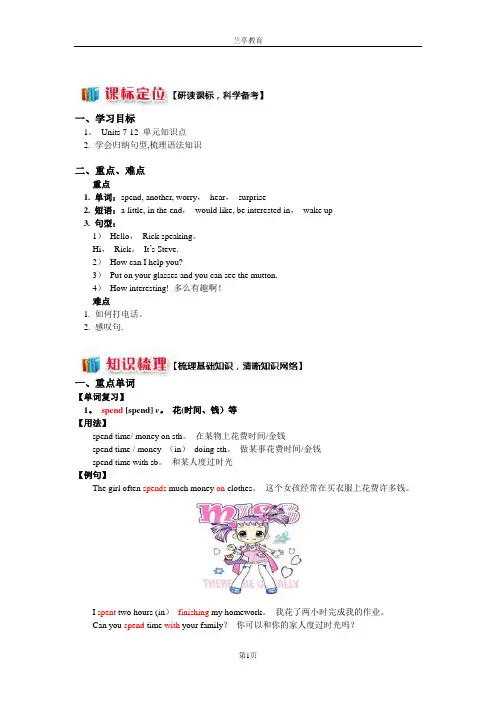
一、学习目标1。
Units 7-12 单元知识点2. 学会归纳句型,梳理语法知识二、重点、难点重点1. 单词:spend, another, worry,hear,surprise2. 短语:a little, in the end,would like, be interested in,wake up3. 句型:1)Hello,Rick speaking。
Hi,Rick。
It’s Steve.2)How can I help you?3)Put on your glasses and you can see the mutton.4)How interesting! 多么有趣啊!难点1. 如何打电话。
2. 感叹句.一、重点单词【单词复习】1。
spend [spend] v。
花(时间、钱)等【用法】spend time/ money on sth。
在某物上花费时间/金钱spend time / money (in)doing sth。
做某事花费时间/金钱spend time with sb。
和某人度过时光【例句】The girl often spends much money on clothes。
这个女孩经常在买衣服上花费许多钱。
I spent two hours (in)finishing my homework。
我花了两小时完成我的作业。
Can you spend time with your family?你可以和你的家人度过时光吗?【拓展】(1) pay常用来表示“付款”,主语是人,其后用介词for。
sb。
pays money for sth. = sb。
spends money on/ doing sth。
(2)cost 表示“花钱”,主语为物。
sth。
costs sb. money. = sb. pays money for sth。
= sb。
spends money on/(in)doing sth。
人教版英语七年级下册 Unit 7-Unit 12 期末重点单词复习
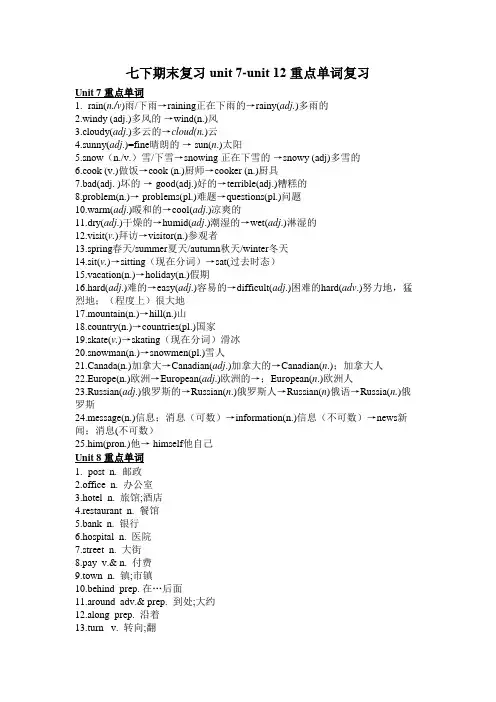
七下期末复习 unit 7-unit 12 重点单词复习Unit 7 重点单词1.rain(n./v)雨/下雨→raining正在下雨的→rainy(adj.)多雨的2.windy (adj.)多风的→wind(n.)风3.cloudy(adj.)多云的→cloud(n.)云4.sunny(adj.)=fine晴朗的→ sun(n.)太阳5.snow(n./v.)雪/下雪→snowing 正在下雪的→snowy (adj)多雪的6.cook (v.)做饭→cook (n.)厨师→cooker (n.)厨具7.bad(adj. )坏的→ good(adj.)好的→terrible(adj.)糟糕的8.problem(n.)→ problems(pl.)难题→questions(pl.)问题10.warm(adj.)暖和的→cool(adj.)凉爽的11.dry(adj.)干燥的→humid(adj.)潮湿的→wet(adj.)淋湿的12.visit(v.)拜访→visitor(n.)参观者13.spring春天/summer夏天/autumn秋天/winter冬天14.sit(v.)→sitting(现在分词)→sat(过去时态)15.vacation(n.)→holiday(n.)假期16.hard(adj.)难的→easy(adj.)容易的→difficult(adj.)困难的hard(adv.)努力地,猛烈地;(程度上)很大地17.mountain(n.)→hill(n.)山18.country(n.)→countries(pl.)国家19.skate(v.)→skating(现在分词)滑冰20.snowman(n.)→snowmen(pl.)雪人21.Canada(n.)加拿大→Canadian(adj.)加拿大的→Canadian(n.);加拿大人22.Europe(n.)欧洲→European(adj.)欧洲的→;European(n.)欧洲人23.Russian(adj.)俄罗斯的→Russian(n.)俄罗斯人→Russian(n)俄语→Russia(n.)俄罗斯24.message(n.)信息;消息(可数)→information(n.)信息(不可数)→news新闻;消息(不可数)25.him(pron.)他→ himself他自己Unit 8 重点单词1.post n. 邮政2.office n. 办公室3.hotel n. 旅馆;酒店4.restaurant n. 餐馆5.bank n. 银行6.hospital n. 医院7.street n. 大街8.pay v.& n. 付费9.town n. 镇;市镇10.behind prep. 在…后面11.around adv.& prep. 到处;大约12.along prep. 沿着13.turn v. 转向;翻14.right adv.& n. 向右边;右边15.left adv.& n. 向左边;左边16.crossing n. 十字路口=turning17.road n. 路 18.often adv. 时常;常常19.air n. 空气 20.enjoy v. 享受;喜爱21.across adv.& prep. 过;穿过(表面)横穿→cross(v.)穿过→through(prep.)穿过(里面),穿透22.front n. 前面→back(n.) 后面23.north n.& adj. 北;北方;北方的→south(n.)南方24.neighborhood n. 街区;街坊→neighbor(n.)邻居25.spend v. 花(时间、钱等) →spent(过去式.)26. climb v. 爬→climber(n.)攀登者27.sunshine n. 阳光→sun(n.)阳光28.free adj. 免费的,自由的,空闲的→freedom(n.)自由29. easily adv. 容易地→easy(adi.)容易的30. money (n.)钱31.police n. 警察(复数)→policeman男警察/policewoman(n.) 女警察32..near prep. 在……附近→by/beside在...旁边/next to紧挨着Unit 9重点单词1.straight(adj.)(adv.)直的/地→curly(adj.)卷曲的2. tall(adj.)高的→short (adj.)矮的3.height(n.)身高;高度→high(adj.)高的4.thin(adj.)瘦的→fat(adj.)胖的5.heavy(adj.)重的→heavily(adv.)沉重地,猛烈地6. tonight(adv.)&(n.)(在)今晚/今夜→today(在)今天7.little(adj.)小的(昵称),少的(否定词) small(adj.)小的8. may( modal v.)也许;可能;可以→May(n.) 五月9. cinema (n.) 电影院=movie theatre→cinemas (pl.)10.glasses(pl.)(n.)眼镜→glass(n.)玻璃,玻璃杯11. later(adv.) 以后→lately(adv.) 近来,不久前12.handsome (adj.)英俊的→good-looking好看的,美的13.actor (n.)演员→actors (pl.) →act(n.)行为;(v.)表演14.actress(n.)女演员→actresses(pl.)15.person(n.)人→persons(pl.)16.nose(n.)鼻子→noses(pl.)17.mouth(n.)嘴→mouths (pl.)18.round(adj.)圆形的19.face(n.)脸→faces(pl.)→face (v.)面对20.eye(n.)眼睛→eyes(pl.)21.singer(n.)歌手→singers(pl.)22.artist (n.)艺术家→artists (pl.) →art(n.)艺术23.put(v.) 放→puts(单三现) →putting(现在分词)24.each(adj.)&(pron.) 每个;各自25.way(n.)方式;路线→ways(pl.)26.describe(v.)描述→describes(单三现)→ describing(现在分词) →description(n.)27.differently (adv.)不同地→different(adj.)不同的→difference(n.)不同→differences(pl.)28.another(adj.)&(pron.)另一;又→other(adj.)&(pron.)其他的29.end(n.)结尾;尽头→ends(pl.) →(v.)结束;终止→ending(n.)结局30.real(adj.)真正的;真实的→really(adv.) 真正地Unit 10重点单词1.noodle(n.)→noodles(pl.)面条2. mutton(n.)羊肉 (u.)3.beef(n.)牛肉 (u.)4.cabbage (n.)卷心菜(u./c.)→cabbages (pl.)5.potato (n.)土豆→potatoes (pl.)6. special (n.)特色菜,特价品→specials(pl.) →special(adj.)特别的rge (adj.)大号的,大的→medium(adj.)中号的→ small(adj.)小号的,小的8. order ( v.)点菜;命令→order(n.) (点的)菜,(下的)命令9. size (n.) 大小,尺码10.bowl (n.)碗→plate(n.)盘子11. meat (n.) 肉 (u.)12.dumpling (n.)饺子→dumplings (pl.)13.porridge (n.)稀饭,粥不可数14.onion(n.)洋葱→onions (pl.)15.fish (n.)鱼→fishes (pl.) →fish (u.)鱼肉→fish(v.)钓鱼 go fishing去钓鱼16.pancake(n.)烙饼→pancakes (pl.)17.world(n.)世界→country(n.)国家18.answer(n.)回答→ask(v.)问→answer(n.)答案19. differently (adv.)不同地→different(adj.)不→difference(n.)不同,不同之处→differences(pl.)20.cake(n.)蛋糕→cakes(pl.)21.candle(n.)蜡烛→candles(pl.)22.age (n.)年龄23.blow(v.) 吹→blows(单三现) →blowing(现在分词)24.candy(n.)糖果→candies(pl.)25.lucky(adj.)幸运的→luck(n.) 运气→luckily(pl.) 幸运地26.popular(adj.)受欢迎的,普遍的→popularity(n.)普及27.idea (n.)想法,主意→ideas (pl.)→opinion (n.)观点,想法28.way(n.)方式;路线→ways(pl.)29.will(model v.)将会,将要→would(过去式)Unit 11 重点单词k(n.)牛奶→milk(v.)挤奶2.cow (n.)奶牛→cows (pl.)奶牛→bull (n.)公牛3.horse(n.)→horses(pl.)马4.feed(v.) 喂养→feeds(v.)三单→feeding(进行式)→fed(过去式)5.farmer(n.)农民→farm(n.)农场→farm(v.)种地→farming(n.)农活6.quite (adv.)相当;完全;很→very(adv.)很;相当7.anything(pron. )任何东西(用于否定和疑问句中)→everything(pron. )所有事物→something(pron. )某事;某物8.grow(v.)→grows(v.)三单→grew(v.)(过去式)种植;生长;变得9.excellent (adj. )极好的→wonderful(adj. )很棒的10.pick(v.)→picks(v.)三单→picked(v.)(过去式)摘;捡起11.worry(v.)使担心→worried(v.)(过去式)→worried(adj.)担心的;焦虑的12.visit(v.)拜访→visits(v.)三单→visiting(v.)(进行式)→visited(v.)(过去式)→visitor(n.)参观者13.luckily(adv.)幸运地→lucky(adj.)幸运的→luck(n.)运气14.painting (n.)油画→paint(v.)粉刷→painted(过去式)→painter (n.)画家;油漆匠15.exciting(adj.)令人兴奋的→excited(adj.)兴奋的16.lovely(adj.)→cute(adj.)可爱的→love(v./n.)爱17.expensive (adj.)贵的→cheap(adj.)便宜的18.slow(adj.)慢的→slowly(adv.)慢地→fast(adj./adv)快的/快地19.guide(n.)向导;指南→guide(v.)带领;引导20.gift(n.)礼物→gifts(pl.)→gift(n.)天赋,才能21.interesting (adj.)有趣的→interested(adj.)对..感兴趣的22.hear(v.)听见→heard(过去式)Unit 12 重点单词1.camp v.扎营搭帐篷→n.露营2.lake n.湖,湖泊(cake蛋糕)3.beach n.海滩,沙滩pl:beaches4.badminton n.羽毛球运动→play badminton打羽毛球5.sheep n.羊绵羊(单复数同形)6.as prep& adv 作为,当做7.natural adj自然的→nature自然8.butterfly n.蝴蝶butterflies9.visitor n.游客访问者→visit参观,访问10.tired adj 疲倦的疲劳的11.stay为...停留在→stayed(过去式)12.away adv.离开远离(leave v.离开)13.mouse老鼠耗子→复数mice14.baby adj& n幼小的婴儿babies15.shout呼叫,喊叫→shouts/shouting/shouted16.ear n.耳朵→ears(复数)17.language n.语言→languages(复数)18.fly v.飞→flies/flying/flew19.kite n.风筝20.high adj& adv 高的→highly adv.高度地21.ago adv.以前→before prep.conj在---以前22.India n.印度→Indian adj.印度的23.tent n.帐篷→tents(复数)24.moon n.月亮(the moon)25.surprise n.惊讶,惊奇v使吃惊→surpring/surprised 26.snake蛇→snakes(复数)27.scared adj惊慌的,吓坏的28.move v.移动→moves/moving/moved29.start v.开始着手→start with以---开始30.jump v.跳,跳跃→jumps/jumping/jumped 31.wake弄醒醒→wakes/woke32.into prep.到...里面, 进入33.forest n.森林→forests(复数)。
新人教版七年级下册英语期末试题(附听力材料及参考答案)
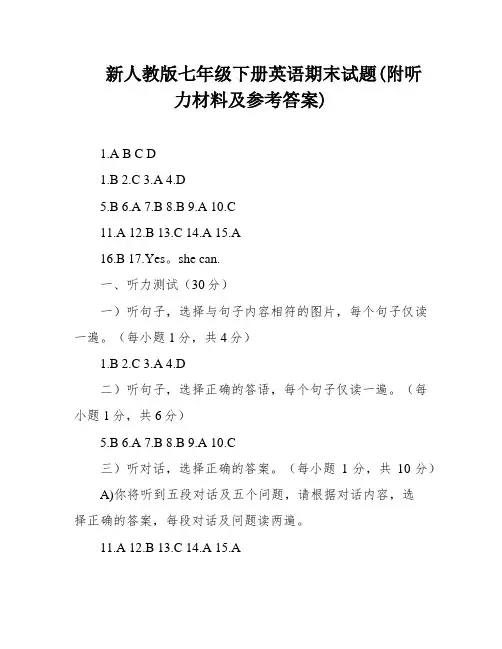
新人教版七年级下册英语期末试题(附听力材料及参考答案)1.A B C D1.B2.C3.A4.D5.B6.A7.B8.B9.A 10.C11.A 12.B 13.C 14.A 15.A16.B 17.Yes。
she can.一、听力测试(30分)一)听句子,选择与句子内容相符的图片,每个句子仅读一遍。
(每小题1分,共4分)1.B2.C3.A4.D二)听句子,选择正确的答语,每个句子仅读一遍。
(每小题1分,共6分)5.B6.A7.B8.B9.A 10.C三)听对话,选择正确的答案。
(每小题1分,共10分)A)你将听到五段对话及五个问题,请根据对话内容,选择正确的答案,每段对话及问题读两遍。
11.A 12.B 13.C 14.A 15.AB)你将听到两段对话,请根据对话内容,选择正确的答案。
每段对话读两遍。
请听第一段对话,回答第16~17小题。
16.B 17.Yes。
she can.26.What was the weather like during Tom's trip?A。
___ ___.27.Who went on the trip with Tom?A。
His family.B。
His ___ classmates.28.Where did they go on the trip?A。
___.29.What did they do on the trip?A。
___.30.What did Tom think of the trip?A。
He ___'t enjoy it.B。
He thought it was okay.C。
Heloved it。
改写建议:17.Sally is very good at speaking which language?18.What is Tom currently doing?19.At what time are they meeting?20.Where ___?21.What is Ann's purpose for being in China?22.Who does Ann usually play games with?23.What is Ann's ___?24.What does Ann and her father appreciate about China?25.In which city do they reside?26.What was the ___'s trip?27.Who panied Tom on the trip?28.Where was their n for the trip?29.___ during the trip?30.What was Tom's n of the trip?How was your trip。
(最新)人教版七年级下册英语期末考试复习试卷(含答案)
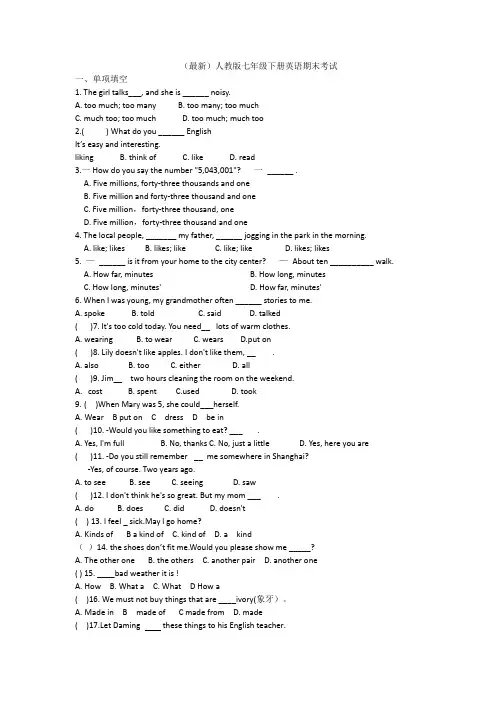
(最新)人教版七年级下册英语期末考试一、单项填空1. The girl talks___, and she is ______ noisy.A. too much; too manyB. too many; too muchC. much too; too muchD. too much; much too2.( ) What do you ______ EnglishIt’s easy and interesting.liking B. think of C. like D. read3.一How do you say the number "5,043,001"? 一______ .A. Five millions, forty-three thousands and oneB. Five million and forty-three thousand and oneC. Five million,forty-three thousand, oneD. Five million,forty-three thousand and one4. The local people, _______ my father, ______ jogging in the park in the morning.A. like; likesB. likes; likeC. like; likeD. likes; likes5. —______ is it from your home to the city center? —About ten __________ walk.A. How far, minutesB. How long, minutesC. How long, minutes'D. How far, minutes'6. When I was young, my grandmother often ______ stories to me.A. spokeB. toldC. saidD. talked( )7. It's too cold today. You need__lots of warm clothes.A. wearingB. to wearC. wearsD.put on( )8. Lily doesn't like apples. I don't like them,__.A. alsoB. tooC. eitherD. all( )9. Jim__two hours cleaning the room on the weekend.A.costB. spentedD. took9.( )When Mary was 5, she could___herself.A.Wear B put on C dress D be in( )10. -Would you like something to eat? ___ .A. Yes, I'm fullB. No, thanksC. No, just a littleD. Yes, here you are ( )11. -Do you still remember__me somewhere in Shanghai?-Yes, of course. Two years ago.A. to seeB. seeC. seeingD. saw( )12. I don't think he's so great. But my mom___.A.doB. doesC. didD. doesn't( ) 13. l feel _ sick.May l go home?A.Kinds of B a kind of C. kind of D. a kind()14. the shoes don’t fit me.Would you please show me _____?A.The other oneB. the othersC. another pairD. another one( ) 15. ____bad weather it is !A.HowB. What aC. What D How a( )16. We must not buy things that are ____ivory(象牙)。
2023年人教版七年级下册英语期末专项复习——单词词组和句型专练
单词词组和句型专练
·英语
Unit 7~Unit 9 一、根据所给中文写出适当的单词。 1.He is cooking (做饭) for his family in the kitchen. 2.I have some problems (难题).I need your help. 3.We all hope to see the famous writer soon (很快). 4.Jerry is badly ill and we have to send him to the
·英语
二、根据句意,用所给单词的适当形式填空。 1.These new ideas (idea) sound great.They are very useful. 2.They were so lucky (luck) that they passed all the tests. 3.I visited my uncle and fed chickens (chicken) with him yesterday. 4.It is a really exciting (excite) story for children. 5.I was really happy because I heard (hear) from my father.
·英语
6.The little girl doesn’t like to stay in the dark (黑暗的) room. 7.He does well in all subjects.He is an excellent (优秀 的) student. 8.There are lots of animals in the forest (森林). 9.Look! There is a big snake (蛇) in the tree. 10.We must live in peace (和睦相处) with the___n_a_t_u_r_a_l __ (自然的) world.
期末复习人教版英语七年级下册单元重点知识点语法汇总
人教版七年级下册-单元重点语法汇总U1情态动词can的用法can是情态动词,意为“能,会”,表示某人或某物具备的能力,还可用来提出请求,没有人称和数的变化,后面直接接动词原形。
下面学习情态动词can的常见用法。
1.表示“能力”,意为“能,会”。
例句:I can speak English.我会讲英语。
2.表示“请求”或“许可”。
例句:Can you help me with my Chinese?你能帮我学汉语吗?You can go to the park after you finish your homework.你做完作业后可以去公园。
3.含有情态动词can的肯定句变否定句时,需在can后加not,其缩写形式为can’t;变疑问句时,情态动词can直接放在句首,构成一般疑问句。
例句:I can sing English songs.我会唱英文歌。
(肯定句)→I can’t sing English songs.我不会唱英文歌。
(否定句)Yao Ming can play basketball.姚明会打篮球。
→Can Yao Ming play basketball?姚明会打篮球吗?(一般疑问句)4.对Can…问句的回答可以用下面几种形式:对询问能力的问句的回答可以说“Yes,…can.”或“No,…can’t.”,表示对能力的肯定或否定;对表示请求的问句的回答可以说“OK./All right.”,表示同意对方的请求。
也可用certainly或sorry来回答。
用certainly作肯定回答,语气更肯定;用sorry作否定回答,语气则更委婉、客气。
例句:—Can you speak English?你会说英语吗?—Yes,I can.是的,我会。
—Can I see your pencil-box,please?请问,我可以看一下你的铅笔盒吗?—All right./Certainly.Here you are.可以。
最新人教版七年级英语下册期末复习试题及答案全套
1. The weather is ________ (干燥的) these days.I can't stand it.2. It's too ________ (寒冷的) outside.We can't go out.3. I ________ (希望) you good luck.4. The chicken that my mother cooks is very ________ (可口的).5. The bank is on your ________ (右边). Can you find it?6. Students often take a ________ (公共汽车) to school.7. Can I ________ (转向) right at the second crossing?8. Wangfujing ________ (街道) is a good place to go shopping.9. My father always ________ (睡觉) for thirty minutes in the afternoon.10. Tony likes drawing so much that he wants to join the art ________(俱乐部).二、根据句意及首字母提示完成单词11. My cousin is f________ to me so I like him very much.12. Jane is a s________ girl.She doesn't like to talk to people.13. Mom usually gets up at 5:50 and then b________ her teeth.14. I want to v________ my teacher this Sunday.15. In Harbin, it's very cold in w________.16. I'm going to Canada for my summer v________ next week.17. A m________ is a person who plays an instrument or writes songs.18. Water is very important to us.So we must s________ it.19. Please follow us, or you'll get l________.20. You can walk to the store.It's not f________ from here.三、单项选择21. —Can Mary ________Chinese?—No, she can't.A. talkB. speakC. tellD. say22. My little brother _______very well. Some of his pictures are on show.A. singsB. dancesC. swimsD. draws23. —Don't be ________, Jim! Please clean your room this morning. —OK, Mom.A. lazyB. smartC. tidyD. strict24. This watch is too expensive. I want to buy a(n) ________ one.A. expensiveB. oldC. cheapD. bad25. I don't like my sister's ________ because they're not ________ to me.A. friendly;friendsB. friends;friendlyC. friendly;friendlyD. friends;friends26. My grandmother often ________ stories at night. What about yours?A. talksB. saysC. speaksD. tells27. —Look! A blind man is in the middle of the street. It's too dangerous. —Let's help him go ________the street.A. crossB. forC. acrossD. along28. My sister is good ________old people.A. forB. atC. withD. of29. David sits ________ Lucy. He is very tall, so she can't see thescreen(屏幕).A. behindB. in front ofC. nearD. next to30. Every evening my daughter plays ________ piano for an hour.A. theB. aC. /D. an一、根据句意及汉语提示填写单词1. We need two ________ (音乐家) for the music club in the city.2. Miss Brown comes from Canada. She________ (说) English.3. We learn Chinese, English, math and ________ (其他的)subjects.4. Mrs. Green is forty, but she looks ________ (年轻的) now.5. I often go swimming in summer, because it's ________ (热的).6. It's getting ________ (凉爽的) in September.7. Today is sunny and ________ (温暖的). Let's go to the park.8. Tom doesn't feel well. Let's take him to the ________ (医院).9. Don't ________ (爬) the tall tree, boys. It's dangerous.10. You can take the book and it's ________ (免费的).二、单项选择11. —Is the juice ________?—No, you have to pay for it.A. deliciousB. healthyC. freeD. cold12. There were ________ people and ________ noise there.A. too many;too muchB. too many;too manyC. too much;too manyD. too much;too much13. You're new here and it's ________ of you to bring a map.A. smartB. strictC. beautifulD. true14. —Helen, don't ________to come here before 6:30.—OK. I'll arrive on time.A. learnB. wantC. forgetD. like15. I don't think the math problem is difficult. I can finish it ________.A. easilyB. stillC. againD. hard16. Look at the photo! I'm sitting ________ Tina and Jim.A. atB. fromC. betweenD. in17. Mr. Smith is good to us, but sometimes he is ________ strict.A. a kind ofB. kinds ofC. kind ofD. a kind18. Lucy is ________ girl. Everyone likes her very much.A. a quite beautifulB. quite beautiful aC. quite a beautifulD. beautiful quite a19. I ________ go fishing. I don't like fishing at all.A. neverB. oftenC. usuallyD. sometimes20. Doing exercise is ________our health.A. good atB. good forC. good withD. well in一、用括号内所给单词的适当形式填空1. You can find the bank ________ (easy).2. The weather is ________ (cloud) today.3. Tom likes China because Chinese people are ________ (friend).4. The boy and his father go ________ (swim) every weekend.5. There are two ________ (hospital) in the neighborhood.6. I can see some ________ (mountain) in the photos.7. What time do you brush________ (tooth)?8. ________ (Lily) family has a cat. It's very interesting.9. It's a ________ (funny) time for the radio show.10. Look! Here are three ________(bus).二、根据句意及首字母提示填写单词11. There is a store b________ the bus stop and our school.12. Jack has to w________ his sports shoes in the P. E. class.13. Be q________! I'm doing my homework.14. We must f________ the school rules.15. It's cold o________. Please come into the room.16. I'm really busy right now. Can I call you back l________?17. Excuse me, can you tell me the w________ to the bank?18. Let's go to the c________ on Sunday. A new movie is to be on (放映)there.19. Your bag is so dirty. Don't p________ it on the bed.20. Ms. Green usually l________ home at 7:30 a. m. and comes backhome at 6:00 p. m.三、根据汉语意思完成英语句子,每空一词21. 我很高兴和你们交朋友。
人教版英语七年级(下)期末复习-- 用所给词适当形式填空
人教版英语七年级(下)期末复习---专题训练用所给单词的适当形式填空1.---How's the weather in Shanghai? ---It's (sun).2. There are many animals in the (mountain)3.---Can you help me carry the heavy box?---Sorry, I (wash) my clothes now.4. It's warm and sunny in my country, and It s very (relax).5.---Could you (tell) them (do) their homework at home? ---Sure, no problem.6. Australia is one of my favorite (country).7. The boys are having fun (swim) in the river.8. I am very happy (have) the chance to go abroad.9. My sister (study) in her room now. She can't play with me.10.Children like making (snowman) in winter.11. There (be) a park and two banks in the neighborhood.12. The hospital is (cross)from the post office. If I want to get there, I have to (cross)the street.13. Kids enjoy (play) games.14. I live in a (noise) street.15. Don't worry. You can find the house (easy).16. (get) to the bank, I need to take. bus No. 2.17. Lisa is good at (play) chess.18. I spend half an hour (exercise) in the morning19. The police (be) looking for the lost boy.20. It's relaxing (play) basketball after school.21. (take) a bus from Sixth Avenue.22. I usually do (I) homework at seven.23. Please turn right at the second (cross).24. My grandparents like to watch me (play) the piano.25. I often go (shop)with my mother and we often(shop)in a supermarket near my house.26. My favorite (act) is Sun Li. She is beautiful.27. The (high) of the building is about 100 meters.28. (one) of all, you have to remember these words.29. I want to be an (art) when I grow up.30. My friend, Tina (look) like her sister very much.31. Different people think about it (different).32. The strange man wears (glass) and (jean) every day.33. He has straight hair. He is (real) handsome.34. ---Are you going (see) you brother? ---Yes, I am.35. Sit (straight ). It's good for you.36. I'd like (drink) some iced tea.37. The number of students in our school (be) over 2, 000. A number of them (be) working very hard.38. Two bowls of soup (be) enough for me.39. It's getting popular (eat) Western food in China.40. I'd like to eat (tomato) , but I don't like (tomato)soup.41.---What would you like to drink? ---I’d like some (orange).42. Two (fly) are flying here and there.43. My mother buys lots of (beef).44. I find three (candle) in the bookcase.45. I would like you (come) to my house.46. (luck), it didn't rain when we climbed the mountains last weekend47. Carol is in (interest)making movies because there are so many (interest)things in it.48. Eric (ride) a horse with his father yesterday morning.49. The little girl (feed) the sheep in the yard and then went out.50. I went to the (farm)and learned a lot about (farm)from the (farm).51. My brother (study) for the math test last night.52. I (not do) my homework last Monday.53. We were (excite)at the (excite)news.54. He (buy) a nice gift in the shop just now.55. They (take) many photos in the mountains yesterday.56. Tina is a (love) girl and she loves to help others57. There are many (sheep) and (mouse) here in the field.58. All my family (fly) kites on the square last weekend.59. Most (visit) enjoy the (nature) scenery.60. This is a (use) lesson for him.61. I often see the old woman (walk) in the park.62. Did your brother have fun (visit) Tian’anmen Square?63. Jim made a fire (cook) food on.64. Mr. King (stay) at home and did nothing.65. Where did you go (camp) last weekend?66.I was very (surprise) to see Tom here.参考答案:1.sunny2.mountains3.am washing4.relaxing5.tell; to do6.countries7.swimming8.to have9.is studying10.snowmen11.is12.across; cross13.playing14.noisy15.easily16.To get17.playing18.exercising19.are20.to play21.Take22.my23.crossing24.playing人教版英语七年级(下)期末复习--用所给词适当形式填空25.shopping; shop26.actress27.height28.First29.artist30.looks31.differently32.glasses; jeans33.really34.to see35.straight36.to drink37.is; are38.are39.to eat40.tomatoes;tomato41.orange42.flies43.beef44.candles45.to come46.Luckily47.interested;interesting 48.rode49.fed50.farm; farming;farmer(s)51.studied52.didn’t do53.excited; exciting54.bought55.took56.lovely57. sheep; mice58. flew59. visitors; natural60. useful61. walk62. visiting63. to cook64. stayed65. camping66. surprised。
- 1、下载文档前请自行甄别文档内容的完整性,平台不提供额外的编辑、内容补充、找答案等附加服务。
- 2、"仅部分预览"的文档,不可在线预览部分如存在完整性等问题,可反馈申请退款(可完整预览的文档不适用该条件!)。
- 3、如文档侵犯您的权益,请联系客服反馈,我们会尽快为您处理(人工客服工作时间:9:00-18:30)。
英语七年级下册短语归纳Unit 1 Can you play the guitar? 1.p lay chess 下象棋 2.speak English说英语3.play the guitar/piano/violin/drums 弹吉他、弹钢琴、拉小提琴、打鼓4. the swimming club 游泳俱乐部5. dance to music 随音乐起舞6. want to do sth 想要做某事7. join the art club 参加艺术俱乐部8. be good at doing sth 擅长于做某事be good with sb 与某人相处得好 be good for 对某人有好处9. tell stories 讲故事10. like to do sth / doing sth 喜欢干某事11. play games with people 与人们玩游戏12. sing and dance 唱歌和跳舞13. make friends with sb 与某人交朋友14. need you to help with sports 需要你帮助有关体育方面的事need help to teach music 需要教音乐的帮助15.on weekends = on the weekend 在周末16.-Can you swim ?-Yes, I can./ No,I can’t.你能游泳吗?是的,我能。
不,我不能。
17.-What club do you want to join ? - We want to join the chess club. 你想参加什么俱乐部?我想参加象棋俱乐部。
Unit 2 What time do you go to school?1.get up 起床2.go to school 去上学3.get dressed 穿衣服4.brush one’s teeth 刷牙5.eat breakfast 吃早餐6. take a shower 洗淋浴7.so early 如此早 8. Have an interesting job 有一份有趣的工作9. work at a radio station 在电台工作 10. at night 在晚上11.That’s a funny time for breakfast. 那时候吃早餐的确很有趣。
12.be late for work / be lare for school上班迟到、上学迟到13.do one’s homework 做作业14.take a walk 散步 15.go to bed late 很晚才睡觉15.clean my room 打扫我的房间16.eat quickly 吃得快 18. half an hour 半小时 19. either... or...不是。
就是。
20.play computer games 打电脑游戏21.watch TV 看电视 22. lots of = a lot of 许多23.get home from school 放学回到家24.It tastes good. 尝起来很好25.-What time do you usually get up?-I usually get up at six thirty. 你通常什么时候起床?我通常六点半起床、26.时间表达法:顺读法:6:30 six thirty逆读法:分钟小于30分钟 6:15 fifteen past sixa quarter past six分钟大于30分钟 6:45 fifteen to sevena quarter to sevenUnit3 How do you get to school? 1.take the train/ bus/subway 搭火车、公车、地铁= do sth by train/ bus/subway2.ride a bike = do sth by bike 骑自行车3.walk = do sth on foot 走路4.every day 每一天5.It’s good exercise. 这是好的锻炼。
6.It’s easy to get to school. 很容易到达学校。
7.The river runs too quickly for boats. 河水流得太急,不适合小船通过。
8.One 11-year-old boy 一个11岁的男孩The boy is 11 years old. 9.be afraid of sth 害怕某物10.dream comes true 梦想成真11.Thank you for doing sth 因某事而感谢你12.-How do you get to school ?-I ride my bike.你怎样到达学校?我骑自行车。
13.-How long does it take to get to school?–It takes about 15 minutes.到达学校话费多少时间?大约15分钟。
It takes sb sometime to do sth. 做某事花费某人多少时间。
14.-How far is it from your home to school?-It’s only about two kilometers. 从你家到学校有多远?大约只有2公里。
Unit4 Don’t eat in class.1.arrive late for class = be late for class 上课迟到2.on time 准时,按时3.in the dining hall 在餐厅4.listen to music in class 上课时听音乐5.wear a hat 戴帽子6. fight 打架7. a lot of rules 许多规则some of the rules 其中一些规则8.bring music players to school带音乐磁带到学校9. have to wear school uniforms 不得不穿校服10.be quiet in the library 在图书馆要安静11.go out 外出娱乐 12.see friends 看望朋友13.practice the guitar 练习吉他practice doing 练习做某事14. do the dishes 洗餐具15.help sb make breakfast 帮助某人做早餐16. on school nights 在上学的晚上17.every Saturday 每个星期六18.too many rules 太多规则(可数名词)too much water太多水(不可数名词)19.make your bed 叠被子20.leave the dirty dishes in the kitchen把脏盘子留在厨房里21.Don’t be noisy. 别吵闹。
22.I can’t relax either .(否定句)我也不能放松。
23.read a book 读书 24. it’s terrible. 很糟糕。
25.I know how you feel. 我知道你的感受。
26.think about 考虑27.be strict with sb 对某人要求严格28. make rules to help us 制定规则来帮助我们29.remember to do sth 记得去做某事30.-What do you have to do?-We have to be quiet in the library. 你们不得不做某事?我们在图书馆不得不安静。
Unit5 Why do you like pandas?1.kind of 有点2.sleep all day 整天睡觉3.I like tigers a lot. 我非常喜欢老虎。
4.be friendly to sb 对某人友好5.one of Thailand’s symbols 泰国的象征之一6.good luck 祝你好运!7.draw very well 画得好8. walk for a long time 走一段很长的路9. get lost 迷路10.help them to live帮助他们生存11. in (great )danger 处于(极大地)危险之中12.cut down many trees 采伐很多树13. lose their homes 失去他们的家园14.sth made of ivory 象牙制品15. -Why do you like pandas?- Because they’re kind of cute.你为什么喜欢熊猫。
因为它们有点可爱。
16. -Where are lions from?–They’re from South Africa. 狮子来自哪里?他们来自南非。
17 动物单词:tiger 老虎elephant大象 koala 考拉panda熊猫 lion狮子giraffe 长颈鹿18.形容词:cute可爱 interesting 有趣fun 好玩smart 聪明lazy懒惰beautiful美丽 scary 凶猛19.国家 China- Chinese 中国-中国人Japan- Japanese 日本-日本人America-American 美国-美国人Australia- Australian 澳大利亚-澳大利亚人Canada-Canadian 加拿大-加拿大人Africa- African 非洲-非洲人Unit6 I’m watching TV.1.watching TV 看电视2.reading a newspaper看报纸3.talking on the phone 在打电话4.listening to a CD 听CDing the computer 使用电脑6.making soup 做汤7.washing the dishes洗餐具8.exercising= playing sports 做运动9. go to the movies 去看电影10. not much 不是很多11.join me for dinner 跟我一起吃晚餐12.eat out 外出吃饭 13.drink tea 喝茶14.be swimming in the pool 在游泳池里游泳15.shopping in the supermarket 在超市购物16.be living with sb 跟某人住在一起17.watching the boat races on TV在电视上看龙船赛18.any other night 任何其他的晚上19. reading a story to her young children给他年轻孩子的读故事20. misses his family思念他的家人21.wish to do sth 希望做某事22.there’s still no place like home .仍然没有地方像家一样23.What are you doing? I’m watching TV.你在干什么?我在看电视24.-Is he reading a newspaper? -Yes, he is. /No,he isn’t. 他正在读报吗?是的,他是。
